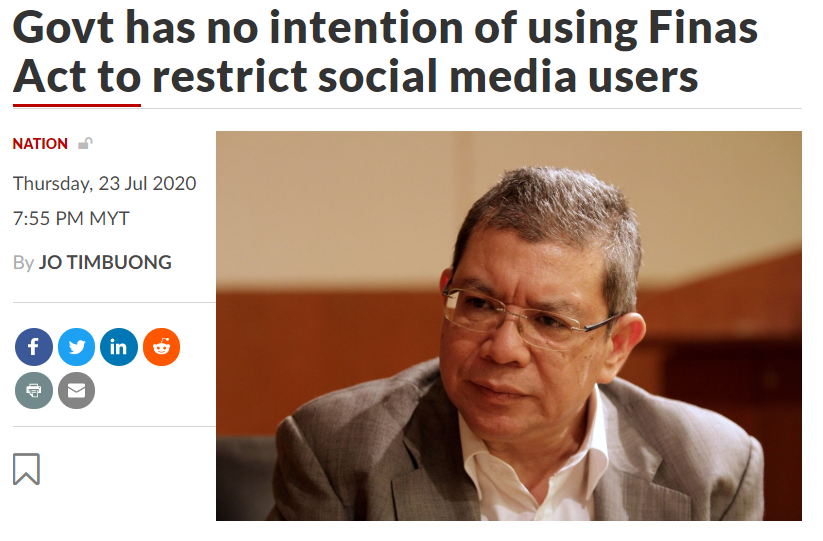Let’s take a throwback to when the Finas Act was enacted. It was 1981. There was no Internet. We only had two TV stations – RTM1 and RTM2. We had to line up for public phones. Almost forty years on, we remain governed by such a legal framework. Which such an awareness, it would come almost naturally to any observer that given we exist in an entirely different media landscape, modernizing such an act would be a no brainer. While this may be true, my time as a Federal Counsel reminded me that legal reforms have always been a tough cookie to crack.
We have arrived at one such opportunity for reform, stemming from the buzz surrounding the Al Jazeera documentary – ‘Locked Up in Malaysia’. Following government scrutiny over the production and broadcast of the show, lawmakers decided to bring this case up in Parliament. On July 23, DAP’s YB Wong Shu Qi had asked the Minister of Communications and Multimedia Saifuddin Abdullah to state if it is compulsory for all those who make films to apply for Finas licenses. Making reference to the Finas Act 1981, he said – “film producers are required to apply for a Film Production Licence and a Film Shooting Certificate, whether they are mainstream media agencies or personal media showing the film on social media platform or traditional channels”.
A big show ensued. Almost no one cared if he had correctly quoted the interpretations clause in Section 2 of the Act whereby the term ‘film’ includes feature films, short films, trailers, advertising “filmlets” and any recording on material of any kind, including videotapes and video discs of moving images, accompanied or unaccompanied by sound, and documentaries, for the viewing of the public. The same clause defines Film Exhibition as films “viewed by the public or any class of the public”. That technicality did not seem to have mattered. Everyone reacted in a way that their fundamental liberties of expression were now clamped down upon. Youtubers, TikTokers – the whole lot. Perhaps that was the missed opportunity to flag for reform on Saifuddin’s end.
As the controversy swelled, within hours, the Minister issued a statement stating that while what he said is correct to the Act, he admits that the act is indeed outdated as social media did not exist in 1981 when the act is drafted. Therefore, he said that “The government will amend the Finas Act 1981 (Act 224) by taking into account the current situations”. So now that the agenda for reform is on the cards, the commitment has to be visible to position this government as one that takes reform seriously. But drawing this case into the wider expanse of the legal framework in the country, we may have to consider the many other “ancient” or colonial laws and some of the lesser-used ones as they do fall off of the radar, and remain unrepealed or unchanged for decades after they have already become outdated.
This whole fracas could be easily remedied by having a mechanism is in place to review old laws periodically. We actually have a Commissioner of Law Revision, who is appointed under the Revision of Laws Act of 1968, and is entrusted with the duty to ‘review archaic and obsolete laws, and to modernize laws to be in tandem with the changing needs of society‘. Under the Section 6 (1) (xxb) of the act, the Commissioner has the power to “delete any word, expression, nomenclature or other provision in any law which has become obsolete or has ceased to have effect, including references to repealed laws, and to substitute, therefore, where necessary, the appropriate word, expression, nomenclature or provision or references to the appropriate laws”. The Commissioner needs to proactively notify the relevant ministry of relevant laws that has since gone obsolete, so that the minister can propose such law be amended or repealed in Parliament. There have been such exercises such as the updates to The Widows And Orphans Pension Act 1915, and the Water Act 1920. These acts, being in common use are constantly updated.
Perhaps as Saifuddin is the Minister of Communications and Multimedia, expectations for measured communications and careful design of messaging is higher. This is not just an expectation held by an opposition member or a media professional, but the regular Malaysian observer. They all demand for public servants who command a policy acumen and provide assurances that they are the right people for the job. Saifuddin is a proven policymaker but at his level, there isn’t much room for oversight. However, opportunities remain for him to be remembered as the Minister who had brought the much-needed reform to the Finas Act 1981. It is also another reminder that such an important office is a thankless job, whose critics are louder than its supporters. As this episode ends, one important takeaway is, in order to be remembered well, he has to continue to keep to the script of reform for the benefit of all Malaysians.


